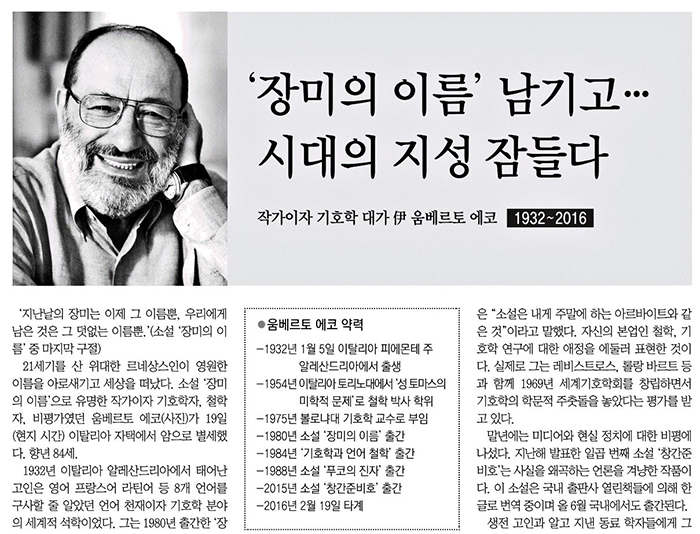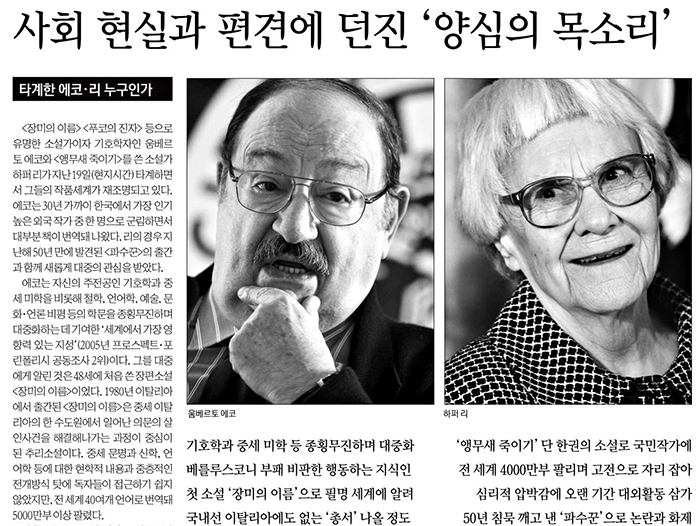Major Korean newspapers recently published obituaries of two great authors, mourning for the loss incurred by the global writing community. The two great authors were Umberto Eco and Harper Lee. Bookstores across the country have set up special kiosks dedicated to the two late authors, and readers have rushed to their favorite book-seller to find Eco's and Lee's works and to begin rereading them.

The Italian novelist Umberto Eco is one of the most popular non-Korean authors here in Korea. Most of his works, ranging from novels and essays and through to his more academic books, have all been published in Korean. In addition to this, a 25-volume special Umberto Eco collection that includes major works of his has also been published as a "fanatic's collection." The author himself mentioned that, "Korea is one of the few countries in which most of my works have been published," in an interview with the Chosun Ilbo newspaper in 2012.
The late author's fame in Korea was clearly seen, as his obituaries were found in most major Korean newspapers and media outlets. Some of them recalled his intelligence and academic insights, commenting, "The loss of a great master and passionate author," or, "Widespread echo of a deep and wide intelligence," while some others were reminiscent of his humor and comments, describing him as a, "modern Renaissance man who loved the Middle Ages," quoting his tweets and interviews. Many papers also added that his posthumous novel "Numero Zero" would be published in Korean this coming June.

Obituaries of Harper Lee, the U.S. author of "To Kill a Mockingbird" who also passed away on the same day, were also published in most major newspapers across the country. The great influence and impact her novel had was once again praised by headlines such as "Lay bare racist prejudices in the U.S." and "Leave a voice of conscience concerning racism."
"To Kill a Mockingbird" is another 20th century classic that is widely read in Korea. In 1960, the novel was published in Korean from the novel's Japanese translation under the title "Children Know," which eventually went out of print. More faithful translations of the novel began to be published in the 1990s, and some 300,000 copies of the novel have been sold since only 2003. Her latest, posthumous and second book, "Go Set a Watchman," was published in July last year 50 years after her first book and was also listed on many bestseller lists at Korean bookshops.
Some of Lee's obituaries reflected on implications for today's Korean society, struggling from conflicts between rich and poor, men and women and across provinces or states. Her first novel was set in a 1930s U.S. where open bigotry and the rich-poor gap were rampant, and the novel's message that no one, living in any time, should face such prejudices resonates in today's Korean society."
By Chang Iou-chung
Korea.net Staff Writer
Photos: Dong-A Ilbo, Kyunghang Shinmun
icchang@korea.kr

The Dong-A Ilbo newspaper publishes an obituary of Umberto Eco. The headline reads, 'Intellect of the era enters eternal sleep... leaving 'The Name of the Rose.''
The Italian novelist Umberto Eco is one of the most popular non-Korean authors here in Korea. Most of his works, ranging from novels and essays and through to his more academic books, have all been published in Korean. In addition to this, a 25-volume special Umberto Eco collection that includes major works of his has also been published as a "fanatic's collection." The author himself mentioned that, "Korea is one of the few countries in which most of my works have been published," in an interview with the Chosun Ilbo newspaper in 2012.
The late author's fame in Korea was clearly seen, as his obituaries were found in most major Korean newspapers and media outlets. Some of them recalled his intelligence and academic insights, commenting, "The loss of a great master and passionate author," or, "Widespread echo of a deep and wide intelligence," while some others were reminiscent of his humor and comments, describing him as a, "modern Renaissance man who loved the Middle Ages," quoting his tweets and interviews. Many papers also added that his posthumous novel "Numero Zero" would be published in Korean this coming June.

The Kyunghyang Shinmun newspaper publishes an obituary, 'The voice of society's conscience, the voice of prejudice's conscience,' for Umberto Eco and Harper Lee who passed away on the same day.
Obituaries of Harper Lee, the U.S. author of "To Kill a Mockingbird" who also passed away on the same day, were also published in most major newspapers across the country. The great influence and impact her novel had was once again praised by headlines such as "Lay bare racist prejudices in the U.S." and "Leave a voice of conscience concerning racism."
"To Kill a Mockingbird" is another 20th century classic that is widely read in Korea. In 1960, the novel was published in Korean from the novel's Japanese translation under the title "Children Know," which eventually went out of print. More faithful translations of the novel began to be published in the 1990s, and some 300,000 copies of the novel have been sold since only 2003. Her latest, posthumous and second book, "Go Set a Watchman," was published in July last year 50 years after her first book and was also listed on many bestseller lists at Korean bookshops.
Some of Lee's obituaries reflected on implications for today's Korean society, struggling from conflicts between rich and poor, men and women and across provinces or states. Her first novel was set in a 1930s U.S. where open bigotry and the rich-poor gap were rampant, and the novel's message that no one, living in any time, should face such prejudices resonates in today's Korean society."
By Chang Iou-chung
Korea.net Staff Writer
Photos: Dong-A Ilbo, Kyunghang Shinmun
icchang@korea.kr
Most popular
- Grammy-winning producer calls Suga of BTS 'amazing artist'
- Animated 'KPop Demon Hunters' tops Netflix charts in 41 markets
- 'Squid Game' events to pump up K-Content Seoul Travel Week
- Reunited BLACKPINK releases video preview of world tour
- 'Universal love, family' themes fuel success of 'King of Kings': director
